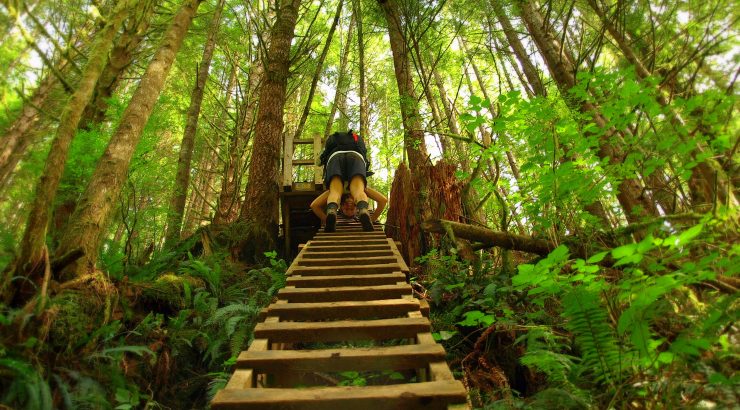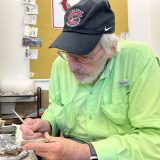To Burgeoning Scientists: Build Ladders of Success with Courage, Persistence, and Imagination
June 24, 2016
Rebecca Richards-Kortum, Ph.D., director of Rice 360°: Institute for Global Health Technologies and esteemed professor at Rice University, delivered the keynote address to Schmid College’s class of 2016 at this year’s Commencement ceremony on May 22. Below is the much-requested transcript of her inspirational address, edited for publication on this blog.
As Chapman University graduates, you made it to the top of a very important ladder of success. The challenge of making it to the top, of course, is that you have to answer the question: now what?
Some of you have other ladders to climb – graduate school, medical school. But someday – perhaps today – you will finally reach the top rung on the last ladder of your formal education. And then, you have to build your own ladder into the future. And if you’re like me, it will seem terrifying. After all, it feels pretty safe to climb ladders built by other people. Not to mention that you just worked really hard to climb to a high place. What if you fall back down? Without grades, how will you know if you’re doing a good job?
Building your own ladder takes courage, persistence, and imagination.
Asnakech’s Ladder: Courage
I want to tell you about the most courageous person I know – my 10-year-old adopted daughter, Asnakech, who started climbing her own ladder as a toddler. She was born in Wolayta, Ethiopia. When she was 3 years old, her mother died. Her father was a subsistence farmer; with his wife gone, he could no longer provide enough food for his daughter. So he made the terribly difficult decision to surrender her to a local orphanage.
A few months later, just as she turned 4, she was sent to a larger orphanage in the capital city, Addis Ababa. It was a 10-hour journey, her first time in a car, and when she arrived she found that only one other girl spoke the same language as she.
Two years later, she took her first plane ride, traveling 36 hours with me to Houston. When she arrived, no one spoke the same language. Just a week after arriving in Houston, she started first grade. Her only English words were “yes”, “no” and “toilet”. Important words to be sure, but they only get you so far on the playground.
I’ll never forget walking her to school the first week. As we passed by the playground, she reached out to clutch the chain link fence with her tiny hands, desperately trying to slow us down. Walking behind, I had to put my hands on her small back and gently push her forward into the school. It broke my heart.
But our school community came together to help her – her teacher was both an adoptee and a certified ESL instructor. Asnakech worked so hard that in 3 months she was reading in English. The cafeteria monitor ate lunch with her every day the first month of school and helped Asnakech find her first best friend.
Asnakech knows what it’s like to lose everything familiar and still move forward. Now she is thinking about where she wants her ladder to take her: she wants to be a doctor when she grows up.
Being part of Asnakech’s experience showed me that we can climb our own ladders even when we don’t have total control over our circumstances. Sometimes we must climb higher even when we don’t know what is at the top. But there are always people who will help us up the ladder.
All of you today have supporters who walked behind you, people who pushed you ahead when you just wanted to cling to the playground fence. Graduates, let’s take a moment to acknowledge the families and friends who are here today – all those people who supported you up the ladder of your education at Chapman.
At Chapman, you’ve done more than just climb ladders of course – you’ve honed your scientific problem solving skills in the context of some of the biggest challenges facing our world. As you move on, I hope you plan to use your expertise in science to solve problems that matter. I hope some of you will tackle the challenges faced by children, who like my daughter, were born into a world full of poverty and empty of opportunity.
The world’s children have never needed scientists and engineers more than they do today. Nearly 90% of children in the world live in developing countries. Half live on less than $2/day. The challenges these children face are enormous. In Ethiopia, the average amount spent each year on health care is less than $25 per person. Only 45% of Ethiopians have access to safe drinking water. The challenges are especially great for girls. Less than half of my daughter’s peers in Ethiopia will learn to read.
Jocelyn’s Ladder: Persistence
I know you already believe that science and engineering can help solve some of the world’s biggest challenges. But you wonder how to begin, and whether you can make a real difference in huge global problems if you are only 22 years old. I want to tell you about one of my former students, Jocelyn Brown, who graduated from Rice with a BS in Bioengineering in 2010. As her senior design project she built a device to help treat premature babies who suffer from breathing difficulties in Malawi.
Malawi has the highest rate of prematurity in the world and half of preemies struggle to breathe because their lungs are immature. In the US, this condition is easily treated using a $6,000 bubble CPAP machine – but $6,000 is unaffordable in Malawi. Using pumps designed for a fish aquarium, her team made a $160 CPAP machine that met US performance standards – more than a 30-fold reduction in cost.
After graduating, Jocelyn took an entry-level job at Rice University and worked for a year to improve her CPAP device. When she turned 23, she moved to Malawi to help coordinate a clinical trial that showed her CPAP machine could more than double rates of survival for premature babies with breathing difficulties. She met mothers who, because of her work, got to go home and celebrate their new babies instead of going home to plan a funeral.
At 25, Jocelyn led implementation of the device throughout the entire country of Malawi. Her technology was licensed by a San Francisco company, and today, at 28, Jocelyn works as their product manager for newborn technologies. She is now leading the global dissemination of CPAP which is being used in more than 15 countries.
I asked Jocelyn once when I visited her in Malawi how she decided to move from the US to Africa. She said, “When else in my life will I have the opportunity to do something like this.” Being open to this opportunity — and having the courage to take an unexpected path — helped Jocelyn find the place to focus her imagination and start building her career ladder. Her persistence helped her climb it.
Francis’ Ladder: Imagination
I recently visited an orphanage middle school in Malawi with Francis Masi, a Malawian college student studying electrical engineering in a country that has 70-times fewer engineers per capita than the US. He encouraged the young orphans to pursue careers in science telling them, “You have to remember that everything in science starts out as something small.” He said, “We all must continue creating and inventing, we must pursue ideas that have the potential to make the world better, even if we have limited resources and even if the ideas seem impossible.”
Engineering students in Malawi need courage and persistence just to begin the study of engineering. In his advice, Francis was also talking about the importance of imagination: if we can imagine that something as small as an aquarium pump can be the basis of a life-saving respiratory technology, we open up a new world of possibility. Even as undergraduates, Francis and his fellow students are improving health in their own country. They are building new tools – using simple light bulbs as heat sources to help keep premature babies warm in the hospital located next to their university.
Your Own Ladder
Of course, not everything we imagine will be successful. But as you are building your next ladder, ask yourself:
Are you willing to accept a world where 90% of children can’t even imagine access to the same opportunities that you’ve been given?
If you don’t want to live in that kind of world, it is time for you to to find the challenge that inspires you. For me, its global health. For you, perhaps its global food shortages, climate change, growing global energy needs – science and engineering hold the key to solving so many global challenges.
Remember – you don’t need anyone’s permission to work toward a solution to the challenges that inspire you. You just need to set aside your fear, focus your imagination, and begin. Begin using your power – the power of science – to transform lives.
Congratulations, class of 2016. I can’t wait to see where your ladders take you.

